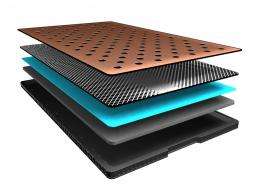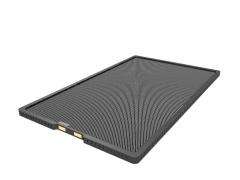October 29, 2009 weblog
New rechargeable zinc-air batteries coming soon

(PhysOrg.com) -- A new breed of rechargeable zinc-air batteries is soon to be available, and may replace lithium-ion batteries in cell phones, laptops and other consumer items. Lithium-ion batteries store only a third of the energy and cost around twice as much as the new batteries.
The Swiss company ReVolt, from Staefa, plans to release the new batteries next year, initially as small batteries for use in hearing aids, and later for cell phones. Eventually much larger batteries are planned for electric vehicles.
The new battery was developed in Trondheim in Norway by the SINTEF Group, the largest independent research institution in Scandinavia, and ReVolt was formed to market the device.
Zinc-air batteries need oxygen from the air to generate the current. They are safer than lithium-ion batteries because they do not contain volatile materials, and therefore do not catch fire. Non-rechargeable zinc-air batteries have been available for some time, but rechargeable versions have proved more difficult to develop.
The battery consists of an "air" electrode, an electrolyte, and a zinc electrode, all set in a casing that lets in air. When the battery is discharging the air electrode (with the help of catalysts) produces hydroxyl ions in the aqueous electrolyte. At the zinc electrode the hydroxyl ions oxidize the zinc, a process that releases electrons to form an electric current. During recharging the process is reversed, with oxygen being released at the air electrode.

In previous rechargeable zinc-air batteries the air electrolyte became deactivated and the reduction and oxidation reactions slowed or stopped after a few discharge/recharge cycles. The battery function could also be degraded if the water-based electrolyte dried out or was absorbed too deeply into the pores, and if the zinc deposited in the recharge cycles built up unevenly, which could cause short circuits.
The new battery uses gelling and binding agents to control the zinc electrode shape, and controls the humidity inside the battery. The new catalysts used have been tested and found to improve both the reduction and production of oxygen during discharge/recharge cycles.
Prototypes of the new battery have been tested for more than a hundred cycles, and are expected to last at least twice as long. CEO of ReVolt, James McDougall, said the company aims to increase the life to between 300 and 500 cycles, which would make them useful for cell phones and electric bicycles.
ReVolt has also been developing zinc-air batteries for use in electric vehicles. These batteries resemble fuel cells, with a zinc slurry forming a liquid zinc electrode, and a series of tubes forming the air electrode. Electricity is generated by pumping the slurry through the tubes, where it is oxidized and releases electrons. The resultant zinc oxide is stored in another compartment and flows back through the tubes when the battery is recharging. This releases oxygen, and the zinc oxide reverts to zinc.
Since the slurry can be in greater volume than the air electrode, the energy density is increased and more electricity is produced. McDougall expects the batteries to last much longer too, for up to 10,000 discharge/recharge cycles. The battery could also be repaired, by replacing failed parts such as the air electrode.
The zinc-air battery for hearing aids will be available next year. The battery for electric vehicles is still some years away from mass marketing.
More information: www.revolttechnology.com/
© 2009 PhysOrg.com

















